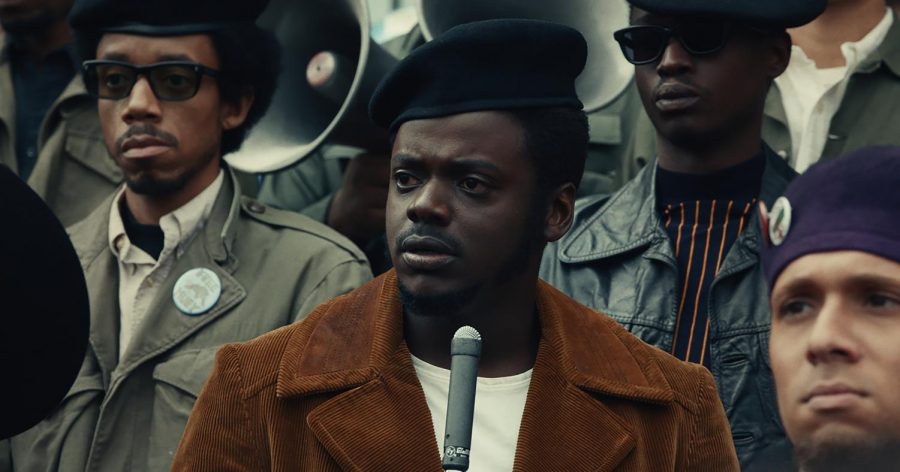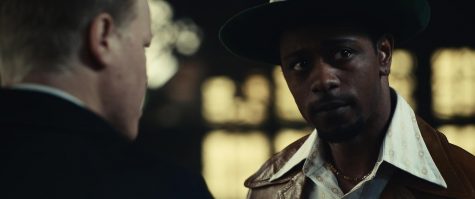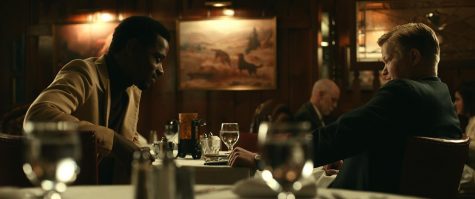
This article was posted on The Daily Aztec website on February 10, 2021.
Fred Hampton is a name some people would not recognize, but many should. He was the Chairman of the Black Panther Party chapter stationed in Illinois and was assassinated at 21 years old in a raid organized by the Cook County State Attorney in 1969.
Director Shaka King’s new film, “Judas and the Black Messiah,” follows the story of Hampton (played by Daniel Kaluuya), through the eyes of William O’Neal (played by LaKeith Stanfield) and the story of his betrayal. O’Neal joined the Black Panther Party as an undercover informant for an FBI officer.
“I can’t play this dude, no way! I hate this guy!”
This was Stanfield’s initial response after discovering he would be portraying O’Neal when in fact he originally thought he would play Hampton.
“I had an internal conflict the whole time,” Stanfield said. “With everything that the character was doing I was conflicted so I guess you can kind of see that working in the character as well.”
The cast had a very unique experience with Fred Hampton Jr, Chairman of the Black Panther Cubs and Mother Akua, formerly known as Deborah Johnson, who sat down with the cast and asked each of them why they wanted to make the movie.
Dominique Fishback, playing Deborah Johnson, said this conversation was about seven hours long.
“I met with Shaka (King) and the first thing I asked was ‘is the family involved?’ because I don’t want to do anything that hurts the legacy of the Black Panther Party,” Fishback said.
Mother Akua said in a virtual summit, “When we were at this meeting, and one thing that we fought for was that we have a say in this piece.”
Kaluuya said Fred Hampton Jr told him if he was going to play the Chairman (Jr’s father) he wanted to see what he was made of.
“I felt meeting the family was necessary…meeting the family and having them be a part of the process and having them enrich what we were doing…was imperative to me and to every one a part of the process,” Kaluuya said.

During their initial meet-up, Fred Hampton Jr. asked someone to look up what the “worst” neighborhood in Chicago was and he took the cast there. Kaluuya described the experience and said as he interacted with the community he thought “I don’t want to look at you, I want to look with you.”
Both Stanfield and Fishback described the day the cast filmed the assassination scene and how real the experience felt.
Stanfield said he felt sick that day, and couldn’t help crying as he tried to get through takes.
“When I was in the apartment that day having to poison Fred I was literally sick that day like I couldn’t stop compulsively crying,” Stanfield said.
“It was so real,” Stanfield said. “Daniel to me was Fred and we were sent back to that house (Hampton House) in those clothes and I thought I was O’Neal and I had to do this.”
Fishback described the love and relationship Hampton and Johnson had shared and explained that she had to mourn the loss of that love on the day of the assassination scene.
“I remember the day before we shot the assassination scene and I couldn’t sleep,” Fishback said. “My stomach was in knots and my heart was racing so fast and I was like ‘what’s going on?’ and I kept telling my brain ‘Daniel is going to be okay.’”
The Lucas Brothers discussed in a virtual summit the circumstances surrounding O’Neal and how he was also a victim of systemic racism.
“I know a lot of brothers who when they watch this movie they are probably going to see themselves more like Will than like Fred,” Keith Lucas said. “Fred is a very unique kind of person, you don’t meet a lot of people who are willing to die for their beliefs but you do meet people who make pragmatic choices all the time.”
“I think (O’Neal) is also a victim of circumstances…this is a story about COINTELPRO and the impact of systemic racism on two young brothers at a particular time,” Kenny Lucas said. “In order to tell that story in a more nuanced way, I think you have to get Will’s perspective.”
Judas and the Black Messiah offers a fresh perspective compared to the brief and skewed overview most history classes provide of the Black Panther Party. The movie touches on so many hushed topics it proves to be an educational and enlightening production.

“Another thing I’m glad this film touched on is the way in which the government was involved and not only involved but actively pushing for these assassinations,” Stanfield said. “‘Like you going to jail fuck that I need something else.’ And I think people need to pay attention to that when they are thinking about their governments and who they put their trust in…you’ve got to consider the corruption.”
Algee Smith who portrays Jake Winter, a Panther member, said the film shows the viewers a true reality of how the Black Panthers and Fred Hampton affected society.
“They’ve tried to wipe it but we get a chance to actually tell the truth and show how Fred Hampton lived, show how these Black Panthers lived,” Smith said. “Because all we have to go off of is how he was assassinated, we don’t have how he lived so to have a film like this to be able to show you the sacrifices that he made, his morals, his righteousness and his good intent because they tried to paint him as a bad person.
“They tried to paint the Panthers as a threat to society but if you look at everything they was doing from the free breakfast program to their own newspapers they were mobilizing, mobilizing for basic human things like basic human rights.”
A poem written by Fishback is featured in a pivotal part of the movie, in which Johnson faces an internal conflict about being both a pregnant woman and a revolutionary.
“It’s not necessarily what you say, it is how you say it,” Fishback said.
Fishback said after she read the script she emailed the director, King and asked if she could mention something she thought was missing from the movie.
“One of the first things in the movie she says to Chairman Fred is ‘do you like poetry’ and the Panthers are and were very poetic people and we don’t get a chance to hear it. We miss that opportunity.”
King agreed with Fishback and asked her if she would like to write the poem.
“I said what I really want to do is show by the end of the film the sacrificial gesture that Mama Akua does when she shields his (Fred Hampton’s) body,” Fishback said.
Kaluuya said he listened to the speeches of Malcolm X and Martin Luther King Jr. to draw inspiration. Fishback also said she had been listening to these speeches before they started filming the movie which created great chemistry during an intimate scene between the Chairman and Johnson.
The most powerful speech in the movie is Chairman’s “I am a revolutionary” speech. Kaluyya said he studied videos of activists’ speeches to help him get into character.
“Daniel was so tapped in that day, we all were, but Daniel was so tapped in that day it wasn’t even him,” Smith said while describing the day the speech was filmed.
Mother Akua said she hopes people know this struggle is still prevalent and the Black Panther Party Cubs are continuing the fight to save their legacy.
“I would like for people to know this is not just something that happened back in the old days in 1969…this work and this fight continues,” Mother Akua said in the virtual summit.
Judas and the Black Messiah will be playing in theaters on Feb. 12 and available on HBO Max for 30 days.
Leave a Reply